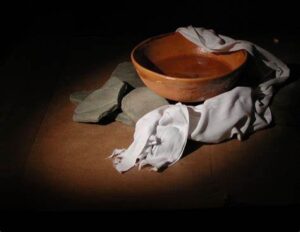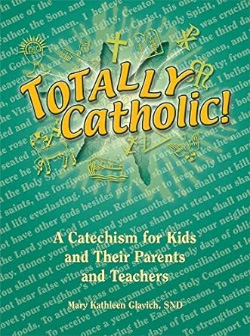 This week a Sister in Africa asked for a copy of the chapter on service from my book Voices: God Speaking in Creation. I realized that the topic is appropriate for my Holy Week blog, so here it is:
This week a Sister in Africa asked for a copy of the chapter on service from my book Voices: God Speaking in Creation. I realized that the topic is appropriate for my Holy Week blog, so here it is:
Towel
[He] got up from the table, took off his outer robe, and tied a towel around himself.
Then he poured water into a basin and began to wash the disciples’ feet and to wipe them with the towel.
John 13:4–5
The night before Jesus died, he demonstrated in a striking way what he meant by “love one another.” At the name of Jesus all beings in the heavens, on Earth, and in the underworld should bend the knee (Philippians 2:10); yet Jesus knelt before his creatures and washed their feet. Peter was right to resist. Washing feet was the job of a servant or slave, not a friend—much less God.
Then Jesus declared that his followers should do the same. Every one of us Christians ought to be girded with a towel as an invisible habit. We should always be prepared to pitch in and do a job that needs to be done for another person, no matter how demeaning or demanding. This could be as easy (or as difficult) as drying the dishes.
The towel is the symbol of servitude. Those who wear it do not focus on how others can meet their needs, save them time, or bolster their ego. Instead, they are alert to ways they can show love. In fact, they try to guess what words and acts will bring pleasure to others. They exercise the ministry of surprises.
We know we have the reputation of being a servant if people frequently ask us for favors. They are not afraid of getting a “no” or a grudging “all right.” We might even be the type that people take advantage of and “walk all over.” In this age of independence, glorification of self, and speaking up for one’s rights, this kind of selfless service may be interpreted as weakness. But imagine how Jesus regards it—he who gave up food, sleep, and, in the end, his very life to help other people.
We can be sure that Mary, the mother of Jesus, often wielded a towel. She, who is the queen of heaven and earth, spent many hours washing and drying dishes, sewing and laundering clothes, and preparing meals.
The earthshaking day that God became flesh in her body, Mary did not pamper herself, though that would have been understandable. No, she went as quickly as she could to minister to her aged relative who was also pregnant. Mary’s sensitivity to the needs of others resulted in Jesus working his first miracle. And after the crucifixion, it was Mary who nurtured the infant Church, no doubt sharing the tasks of the other holy widows.
Jesus turned around our concept of authority figures. No longer are they to be on a pedestal, lording it over their subservient subjects and waited on hand and foot. Rather, the leaders in the kingdom of God walk among the people caring for their needs and enabling them to be holier and happier members of that kingdom. Pope Francis urged priests to be shepherds with the smell of the sheep. It’s not merely for the sake of decoration that priests and deacons wear a stole. The word “stole” is derived from stola, which is Latin for towel. The highest leader of the Church bears the title “Servant of the Servants of God.”
A towel has pleasant connotations. Think of wrapping yourself in a luxurious Turkish towel after a hot bath, lying in the sun on a beach towel, and being presented with thick, fluffy guest towels on a visit. Towels are associated with warmth, security, and love. This is what we are meant to offer one another through our acts of service. As a towel is used in the process of cleansing, we can help wash from others’ lives what is ugly and evil. We can teach them truth and show them goodness. As a towel absorbs water, we can blot another person’s fears and tears. This service can be rendered by caring enough to take time to listen to people who are hurting. Just as being rubbed down with a towel is invigorating and brings a healthy glow to our skin, we can bring life to others by giving them hope and loving them.
Jesus washed not only our feet; he washed the whole of us. He took our sin upon himself, and the world was cleansed. What the flood of Noah couldn’t do, the blood of Jesus did. Through his death and resurrection, Jesus made all things new. He is still serving us, still washing us. In the waters of baptism, he takes away all stain of sin. When it sullies us again during the battle of life, in the sacrament of reconciliation he restores us to our pristine baptismal beauty.
Not only should we let Jesus serve us by celebrating the sacraments, but we should also graciously allow other people to serve us. Paradoxically we serve others when we let them serve us. A stubborn self-sufficiency, saying “No thanks. I can do it myself,” deprives other people of the joy of loving. So let’s ask for help, accept offers of help, and seek opinions. These acts of dependency can require as much humility as it takes to wash someone’s feet.
In Psalm 116:12 we ask, “What shall I return to the Lord for all his bounty to me?” One legend discloses the answer. It is said that one day St. Anthony the Hermit asked his disciples, “When is the first moment of daybreak?” A follower answered, “Is it when we can discern the forest?” “No,” said Anthony. “Is it when we can distinguish one tree from another?” suggested another disciple. “No,” Anthony replied. “Tell us,” said a third student. Then Anthony stated, “The first moment of daybreak is when we see the face of Christ in the face of our neighbor.”
What we do to another person, we do to Jesus. This is the message of “The Story of the Other Wise Man” by Henry van Dyke.
Artaban was to accompany Caspar, Melchior, and Balthazar on a pilgrimage to the newborn king of Israel. He sold everything to purchase a sapphire, a ruby, and a pearl as tribute. When he sees the new star, he begins his journey to meet the three wise men according to plan. He is delayed when he stops to revive a dying Hebrew, and the other Magi leave without him. Then he must sell his sapphire to buy provisions for his solitary journey. In Bethlehem a young woman with a baby offers him hospitality. She tells about strangers from the East who visited Joseph and his family. That night when Herod’s soldiers come to slaughter the children, Artaban gives the captain the ruby to save the woman’s infant. He spends the rest of his life searching for the king among the poor and ministering to them.
Finally, in Jerusalem, Artaban hears of a man who is going to be crucified for claiming to be king of the Jews. He intends to offer his pearl as ransom for his life. But then he meets a troop of soldiers dragging a girl to be sold as a slave. She pleads for his help, and he gives her the pearl. Suddenly there is an earthquake, and a tile strikes Artaban on the head. Bending over the old man, whose face is suffused with joy, the girl hears a faint voice say to him, “Inasmuch as thou hast done it unto one of the least of these my brethren, thou hast done it unto me!” The other wise man had found his king.
When Jesus washed and dried the feet of the apostles, his brothers, it is significant that Judas was among them.
For Reflection and Discussion
- What statement or passage in this chapter did you find particularly meaningful?
2. In what ways do other people serve you? You might remember to thank them and pray for them!
- Do you know people who are truly “servant” leaders? Why would you give them this title?










One Response
Thanks for sharing.
Like trees, so many ways to appreciate towels.
How about monks and the way they dress? They wear cloth
and serve the world beautifully with prayer and service. Cloth
takes on a tremendous new meaning for me.